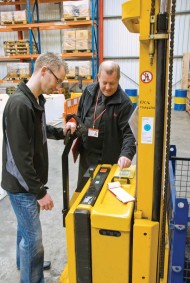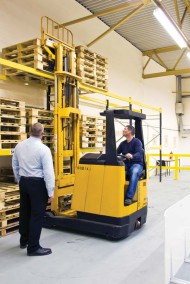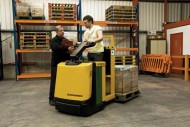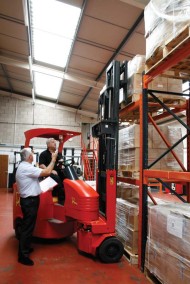 In today’s safety-conscious environment, many UK companies with warehousing and logistics operations recognise the need to give proper training to their staff members who are required to operate forklift trucks, yet sadly accidents still happen.
In today’s safety-conscious environment, many UK companies with warehousing and logistics operations recognise the need to give proper training to their staff members who are required to operate forklift trucks, yet sadly accidents still happen.
Mentor Training is the UK’s leading provider of training and associated services for all types of materials handling equipment and workplace transport. It plays an active role in helping warehouse and site managers and supervisors address the challenge of ensuring the safe operation of forklift trucks and other workplace transport. Mentor does this by providing not just basic training but also refresher courses, as well as maintaining operator databases to ensure compliance with the latest best practice and legal requirements.
Mentor is able to offer a one-stop-shop service that ensures guaranteed peace of mind for busy company Directors and their HR, Training and Health and Safety Managers. Its experience, size and structure ensure the most professional and cost effective support for every type and size of business. In today’s safety conscious environment, Mentor also helps customers ensure their training paperwork is fully up to date. Mentor’s customer service covers the full management and safe documentation of company training information and records.
Steve Baldwin, Mentor Training’s Technical Manager, spoke to Warehouse & Logistics News.
Warehouse & Logistics News – When was Mentor Training founded?
Mentor was established in Chesterfield, Derbyshire in 1988, and since then has trained over 200,000 delegates in over 4,000 companies nationwide.
WLN – Do you have any training centres anywhere else in the UK? What about in other countries?
Complementing Chesterfield we have a training centre in Bromsgrove, Worcestershire and another in Livingston, Scotland. Although we don’t have any overseas training centres, we have trained in many countries and are happy to do so.
WLN – How big is Mentor these days in numbers of trainers and annual numbers of people trained?
The Mentor team comprises over 180 training professionals and support staff, who provide 24/7 nationwide coverage. In the last financial year we provided almost 30,000 days of the most competitively priced training for every type and size of business.
 WLN – Why choose Mentor as a training provider?
WLN – Why choose Mentor as a training provider?
Mentor’s greatest asset is its depth of resource in people and systems. We don’t simply want to sell people training sessions. We take exceptional pride in our adaptability, responsiveness and professionalism. Our company culture is based upon a total commitment to understanding customer needs, offering cost effective relevant training solutions and putting the increasingly complex needs of our customers first.
WLN – Do you train people to use any other equipment?
Yes, we are a company that tends to specialise in materials handling equipment and workplace transport, so if a product needs moving there is every chance that we can provide training on the equipment that moves it. For instance many companies use Electric Overhead Travelling Cranes (EOTC) for moving stock and vehicle loading/unloading. These cranes can be either pendant, remote or cab controlled – we provide accredited training on all of them, as well as load slinging.
Builders’ merchants supply their customers with goods via a lorry mounted crane, which can be fitted with a wide range of attachments to enable them to handle diverse products from packs of 5 metre long timber to loose sand, kerb stones and underground drains. We train on all of these. The extractives industry utilises equipment such as large wheeled loaders, rigid and articulated dumpers, bulldozers, excavators and mobile screens and crushers to extract and process material from the ground. The waste recycling industry utilises very similar equipment as does the utilities sectors. We train on all of these.
A wide range of companies need to utilise powered access equipment such as boom or scissor lifts to get personnel to positions of work or to enable stocktaking. We train on all of these.
As well as providing what I will term ‘standard’ courses, we have also worked with customers to develop many customer specific training packages. These can be as diverse as training on fall protection systems for drivers who have to get onto the back of their heavy goods vehicle, to training for operators on how to load and secure specific items of plant on road going vehicles to how to handle specific awkward loads with lift trucks.
As well as training people to use various items of equipment we also train instructors on either in-house or fully accredited courses. One of the biggest challenges industry faces with regards to accident prevention is raising awareness among managers and supervisors of how different types of equipment should be used. To this end we developed a course for managers and supervisors of forklift trucks which looks not only at the stability characteristics of FLT and the operating styles that will make them become unstable, but also makes managers aware of their legal responsibility to manage safety.
WLN – As Technical Manager, what is your role day to day at Mentor Training? Do you get personally involved in devising and carrying out training?
The role is quite varied, but boils down to me being responsible for the quality of what we deliver to our customers. This covers everything from the content and structure of our courses to the knowledge, ability and professionalism of our instructors. As far as hands-on training is concerned, I run our forklift managers course and the IOSH managing safely course along with elements of internal staff training.
WLN – What is your background – have you been a forklift trainer, a warehouse manager or something similar?
I first got involved in hands on training in 1985 through becoming a driving instructor, a job I continued in for about eight years before going back into industry. Once there I became a shift manager in a car parts manufacturing company and organised in-house training for lift trucks, cranes and in-house systems and procedures, some of the latter I carried out myself. Prior to becoming a driving instructor I had jobs that involved me operating a range of equipment encompassing forklift trucks, overhead cranes, wheeled loaders, dumpers and skid steer loaders. On starting work for Mentor in 1999, I certainly found that my experience in training and on operating this range of equipment was useful to me, and has continued to be ever since.
 WLN – Who else is on the Mentor Training management team besides you?
WLN – Who else is on the Mentor Training management team besides you?
Not counting the Directors there are eight of us in total on the management team, each responsible for an element of the business from operations to sales to finance to marketing and so on. Day to day management of our instructors falls under the responsibility of the operations team, who have five members based at our head office in Chesterfield, with a further six training managers spread throughout the length and breadth of the country. The training managers are responsible for enhancing and maintaining the skills of our team of more than 140 instructors, and visit them on a regular basis.
WLN – Do you also run training courses at end users’ premises?
Although we have three training centres over 95% of our training is carried out at customers’ premises. We find this works out really well for a number of reasons, not least that the delegates are learning on the same equipment that they will be using following training. They are also handling the loads that they will be handling following training, in the areas that they will be working in following training.
For the customer there is also the added benefit of cost, as on top of paying for the training they would also have to cover the cost of getting the delegates to and from a training centre, along with the possibility of having to pay the delegates overtime for travel. Having said that, there will always be some customers who can’t accommodate training on site, and for these we have the training centres.
WLN – What’s your view of the general level of understanding among managers and supervisors of what constitutes unsafe equipment operation? Do you help managers and supervisors to look at the level of safety in their operational area and improve it?
For me this is the big one, the missing link as far as workplace transport risk management is concerned. Unlike robots we humans are not predisposed to operating in exactly the same way time after time, it’s what makes us human after all. It’s also what causes us to have accidents, as it makes us complacent and leads to us cutting corners – let me explain.
During his training a forklift truck driver will have been told to make an all-round check to make sure that the area around him is clear before he moves away, just as he will be told to always look in the direction of travel. However if after his training he starts by looking all round before moving off but never sees anything, or looks behind him when reversing just a few yards but never sees anything it is only a matter of time before he starts to believe that these checks aren’t really necessary and starts to miss them out. Likewise although he’s been told during training that he shouldn’t, he may start to turn with the load in the air to reduce the time it takes him to do a particular job. His justification to himself may be that “it’s only a light load” or, “I am only doing it slowly so there won’t be a problem.” In reality what he is doing is starting down the slippery slope of ignoring the safe operating techniques he has been taught and therefore putting himself, his colleagues and his company in danger. This is where effective management comes in to prevent a dilution of standards in order to ensure safety.
I said earlier that my role was quite varied, and part of it is that I, along with a couple of others, provide a workplace transport consultancy and risk management service for our customers. Typically we will be invited to look at an operation and pass comment on where they stand currently and detail what they require to do to eliminate the risks to the business that we have found. As well as looking at a whole raft of things including procedures and the standard of forklift operating, part of the visit always involves us speaking to the people who supervise and manage lift truck operators to determine their level of knowledge. As you would probably expect we find a really mixed bag here, with some managers and supervisors being very knowledgeable about how lift trucks should be being operated, while others do not have a clue. For the knowledgeable ones we just need to give them a few ideas as to how they can improve proactive monitoring of the operation to predict where issues will occur, in order to prevent them happening. For the less knowledgeable we recommend they attend a one day course that will not only give them the knowledge of lift truck operations and the laws which they must comply with, but will also give them a recognised AITT qualification.
WLN – Who accredits your training courses?
Our lift truck based training courses for the vast majority of industries are accredited by AITT. However some specific industries have developed their own standards, and when we train for companies in these industries the training packages we deliver have been approved by the recognised industry standards. For instance when training for the extractives and minerals processing industries, we train under the Mineral Products Qualifications Council (MPQC) accreditation scheme. When training in the utilities and waste sectors we train under the industries Sector Skills Council’s approved scheme EU Skills Plus. For the construction industry we deliver training to the National Plant Operators Registration Scheme (NPORS). When carrying out access platform training (MEWP) we train under the International Powered Access Federation (IPAF) standard, and when training on modular scaffolding train under the Prefabricated Access Suppliers and Manufacturers Association (PASMA) scheme.
 WLN – Are there more or less forklift accidents these days? Why do you think this is?
WLN – Are there more or less forklift accidents these days? Why do you think this is?
The number of fatalities each year involving workplace transport continues to be, as it has been for a number of years, second only to falls from height. Within the umbrella of equipment categorised as workplace transport, forklift trucks continue to account for most of these. The numbers killed and injured each year show slight variations but if taken over a five-year rolling average there isn’t a lot of change. It seems like we have reached a sort of natural plateau that without further initiatives will stay pretty much as it is.
WLN – What sort of further initiatives would you like to see?
For me the ideal one would be a combined initiative taken by organisations involved with lift trucks and headed up by the HSE. This would focus on ensuring that managers and supervisors of forklift operations are trained as per the requirements of Regulation 9 of the Provision and Use of Work Equipment Regulations 1998 (PUWER). Regulation 9 requires that not only are the operators of work equipment (in this case forklift trucks) trained, but those who manage them have sufficient training to be able to determine when one is being driven correctly or incorrectly. These knowledgeable managers and supervisors will then be the ones that will drive accidents and incidents down.
WLN – If people are interested in having forklift training with you, who do they need to contact? How quickly can you organise training sessions?
Just call 01246 555222 and advise where in the country you are calling from, and you will be transferred to the training advisor for that area. All our account managers receive extensive training in the equipment types we train on and are able to organise a customer’s training requirements, from booking a single day’s training to taking information as to the customers whole range of requirements and then producing a detailed training matrix. They pride themselves on being able to complete the required training in the most cost effective way for the customer, and have a vast amount of experience in working with complex shift patterns.
From receiving an initial enquiry to having an instructor on site anywhere within the UK can take as little as five days. We can quite often provide an instructor the following day in an emergency.
 WLN – Finally, where do you see forklift training in general, and Mentor Training in particular going from here?
WLN – Finally, where do you see forklift training in general, and Mentor Training in particular going from here?
Whilst over the years there have been a number of initiatives and alternative ways suggested of trying to train fork lift operators, fundamentally I believe that what we have today is a tried and trusted solution that has evolved over the past 25 years. Having got the operator training about right, there is a need to tighten up on managers’ training.
As far as Mentor is concerned, we are the largest training provider in the UK and we firmly intend to remain in that position. We continue to improve and broaden the services we offer our customers, inline with their requirements – as after all, that’s what it’s all about.
Mentor FLT Training Limited
Tel: 01246 555222





Comments are closed.